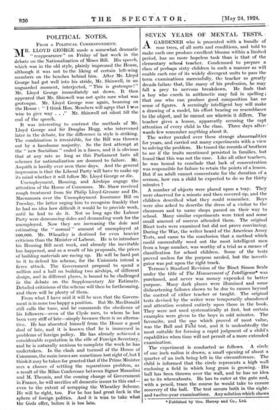POLITICAL NOTES.
FROM A POLITICAL CORRESPONDENT.
'MR. LLOYD GEORGE made a somewhat dramatic " reappearance " on Friday of last week in the debate on the Nationalization of Mines Bill. His speech, which was in the old style, plainly impressed the House, although it was not to the liking of certain left-wing members on the benches behind him. After Mr. Lloyd George had got well into his stride, Mr. Shinwell, in an unguarded moment, interjected, "This is grotesque ! " Mr. Lloyd George immediately sat down. It then appeared that Mr. Shinwell was not quite sure what was George had got well into his stride, Mr. Shinwell, in an unguarded moment, interjected, "This is grotesque ! " Mr. Lloyd George immediately sat down. It then appeared that Mr. Shinwell was not quite sure what was grotesque. Mr. Lloyd George rose again, beaming on the House : "I think Hon. Members will agree that I was wise to give way . . ." Mr. Shinwell sat silent till the end of the speech.
It was interesting to contrast the methods of Mr. Lloyd George and Sir Douglas Hogg, who intervened later in the debate, for the difference in style is striking. The combination is irresistible, for the Bill was thrown out by a handsome majority. So the first attempt at the "new Socialism" ended in a fiasco, and it is obvious that at any rate as long as this Parliament lasts all schemes for nationalization are doomed to failure. Mr. Asquith is hardly ever seen these days. And the general impression is that the Liberal Party will have to make up its mind whether it will follow Mr. Lloyd George or die.
Unemployment, Housing, and Airships engage the attention of the House of Commons. Mr. Shaw received rough treatment from Sir Philip Lloyd-Greame and Dr. Macnamara over the Unemployment Insurance Bill on Tuesday, the latter urging him to recognize frankly that he had no idea how difficult it would be to provide work, until he had to do it. Not so long ago the Labour Party were denouncing doles and demanding work for the unemployed. Now they are increasing the dole and estimating the " normal " amount of unemployed at 800,000. Mr. Wheatley is destined for even heavier criticism than the Minister of Labour. He is to introduce his Housing Bill next week, and already the inevitable has happened, and as a result of his proposals, the prices of building materials are racing up. He will be hard put to it to defend his scheme, for the Unionists intend a fierce attack. The Government proposal to spend a million and a half on building two airships, of different design, and in different places, is bound to be challenged in the debate on the Supplementary Air Estimate. Detailed criticisms of the scheme will then be forthcoming, and there will be plenty of them.
From what I have said it will be seen that the Govern- ment is in none too happy a position. But Mr. MacDonald still calls the tune, and he commands the obedience of his followers—even of the Clyde men, to whom he has been very stiff of late—simply because there is no alterna- tive. He has absented himself from the House a good deal of late, and it is known that lie is immersed in problems of foreign policy. He has already achieved a considerable reputation in the role of Foreign Secretary, and he is naturally anxious to complete the work he has undertaken. In the clash and turmoil of the House of Commons, the main issues are sometimes lost sight of, but I think it may be taken for granted that if the Prime Minister sees a chance of settling the reparations problem, as a result of the Milan Conference between Signor Mussolini and M. Theunis, and the coming change of Government in France, he will sacrifice all domestic issues to this cad— even to the extent of scrapping the Wheatley Scheme. lie will be right, too. For he has had great luck in the sphere of foreign politics. And it is wise to take what the Gds offer, before it is too late.










































 Previous page
Previous page